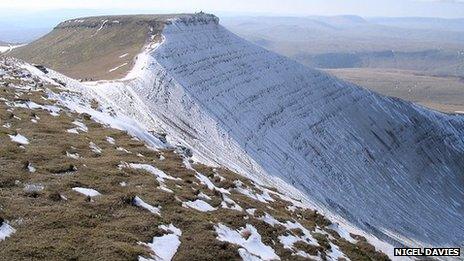Wales snow: Rescuers' mountain walk equipment warning
- Published

Walkers are being warned not to tackle Wales' highest peaks in bad weather without the proper equipment
Walkers are being warned not to venture up mountains without proper equipment following two rescues on the same peak at the weekend.
Mountain rescue teams faced dangerous conditions in rescues on Corn Du in the Brecon Beacons on Saturday and Sunday.
A walker slipped and broke her ankle on Saturday while another broke two bones in a leg on Sunday.
Rescuers said walkers should think twice about venturing up high mountains in poor weather.
Mark Jones, deputy team leader of Brecon Mountain Rescue Team, said: "We would call on anyone heading out into the mountains during this cold snap to be properly equipped with crampons, ice axe or walking poles, warm weather gear, map, compass and torch.
"If you are unused to high level walking it may be better to stick to the lower slopes."
On Saturday, a 34-year-old woman from Birmingham slipped and broke her ankle while descending Corn Du.
Other walkers, including an off-duty police officer, raised the alarm and kept her warm in the freezing conditions on the 873m (2,864ft) mountain.
Some 30 members of Brecon, Central and Longtown mountain rescue teams were called and difficult conditions meant she could not be reached by rescue helicopter.
She was carried down the mountain by stretcher to Storey Arms where an ambulance was waiting.
"Eight people at a time work in relays to carry the stretcher down the mountain with pathfinders checking the route," said Mr Jones.
Difficult weather
"They all wear crampons to avoid slipping and the stretcher is back roped for added security. They had to deal with deep snow, ice, steep drops and other obstacles."
The second rescue was on Sunday afternoon when a 28-year-old man from Pontyclun, Rhondda Cynon Taf, slipped, and broke two bones in his lower leg while descending the same mountain.
His friend raised the alarm and 50 members from four mountain rescue teams were called to his aid.
Difficult weather conditions meant he could not be reached by RAF helicopter at first but he was eventually airlifted to hospital.
Mr Jones said rescuers strongly advised walkers to carry several layers of spare clothing.
"While they may not be needed during a walk, in the event of an accident, a casualty could be sitting in the snow and ice for over an hour before search teams reach them," he said.
"These extra clothes will delay the effects of hypothermia and could save a life."
- Published22 March 2013
- Published21 January 2013
- Published21 January 2013
- Published20 January 2013
- Published18 January 2013
- Published18 January 2013
- Published18 January 2013
- Published18 January 2013